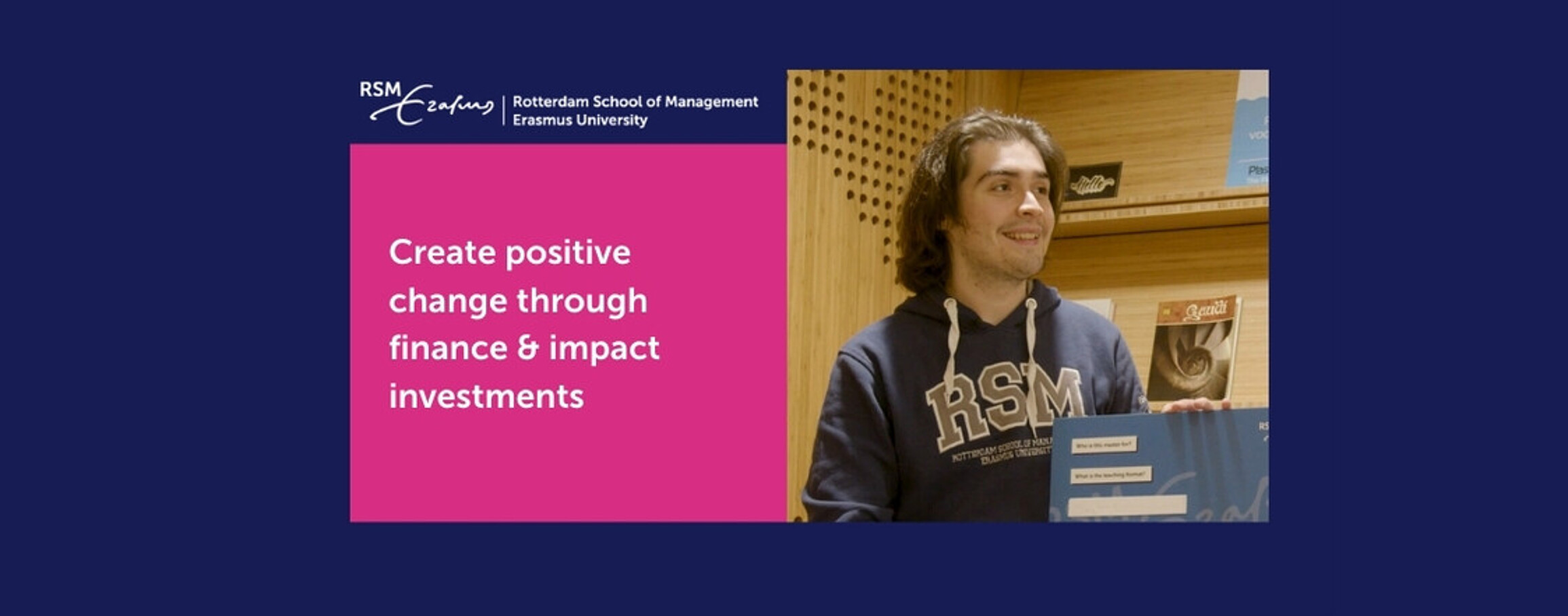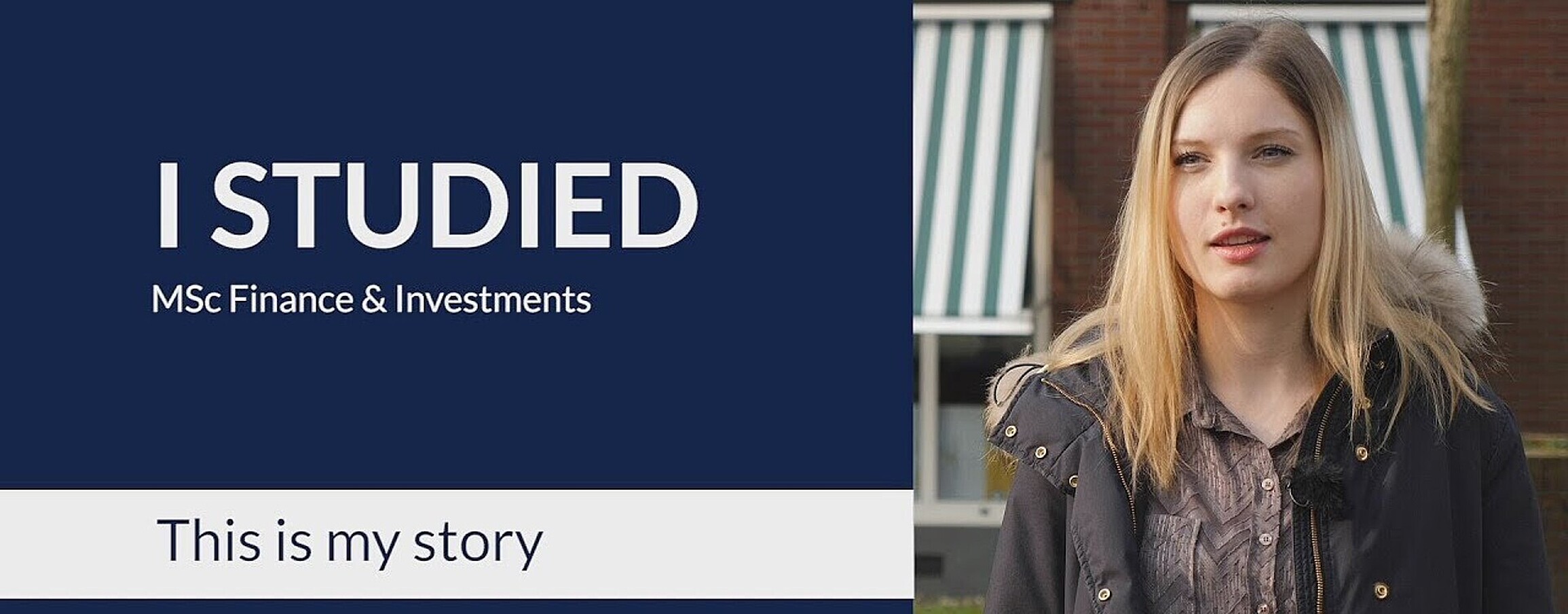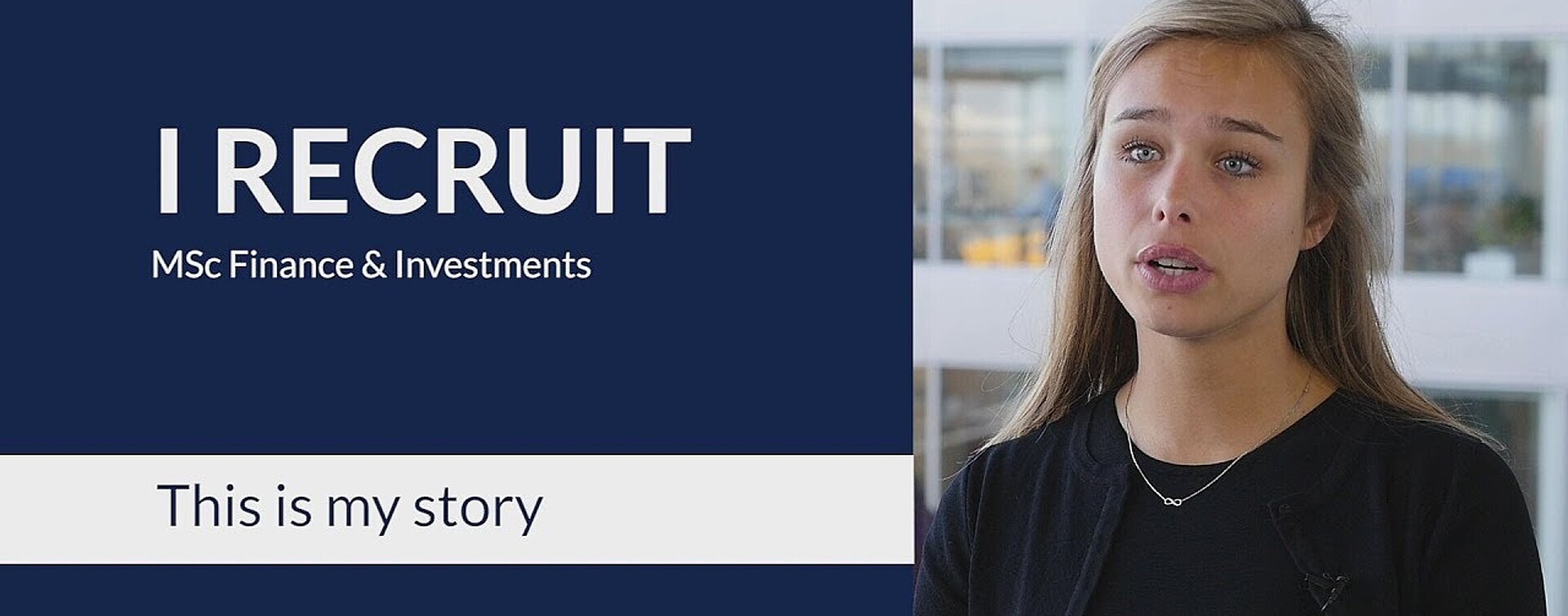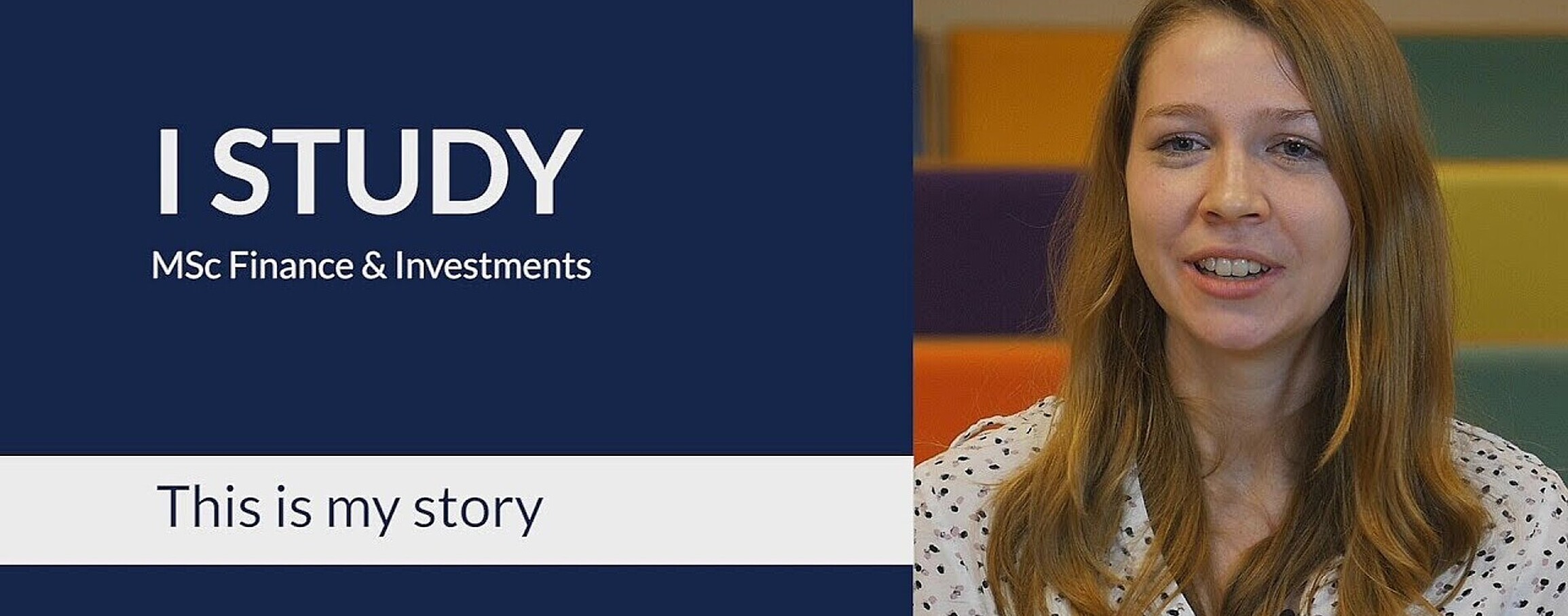Curriculum
Do you want to know more about the MSc in Finance & Investments programme?
The video below will answer the most frequently asked questions about the programme.
Overview
The MSc Finance & Investments is an intensive 12-month programme. Core courses are compulsory and will be offered during the autumn semester (26 EC). During the spring semester we offer master electives (18EC). To provide some guidance, we propose four different tracks, each related to a different career profile (see below for track information). You can also replace one elective with an internship or a business project. Throughout the year, you can work on your master thesis project (16 EC).
MSc programmes are often associated with a research group, guided by accomplished researchers making meaningful contributions in their respective fields. For a closer look at the exciting research initiatives by our academic faculty, we encourage you to explore the department of Finance under which the MSc Finance & Investments falls.
Academic calendar
Please note that core courses and electives are subject to change each academic year. While some electives are very popular and we can place most students in the elective(s) of their choice, there are no guaranteed places.
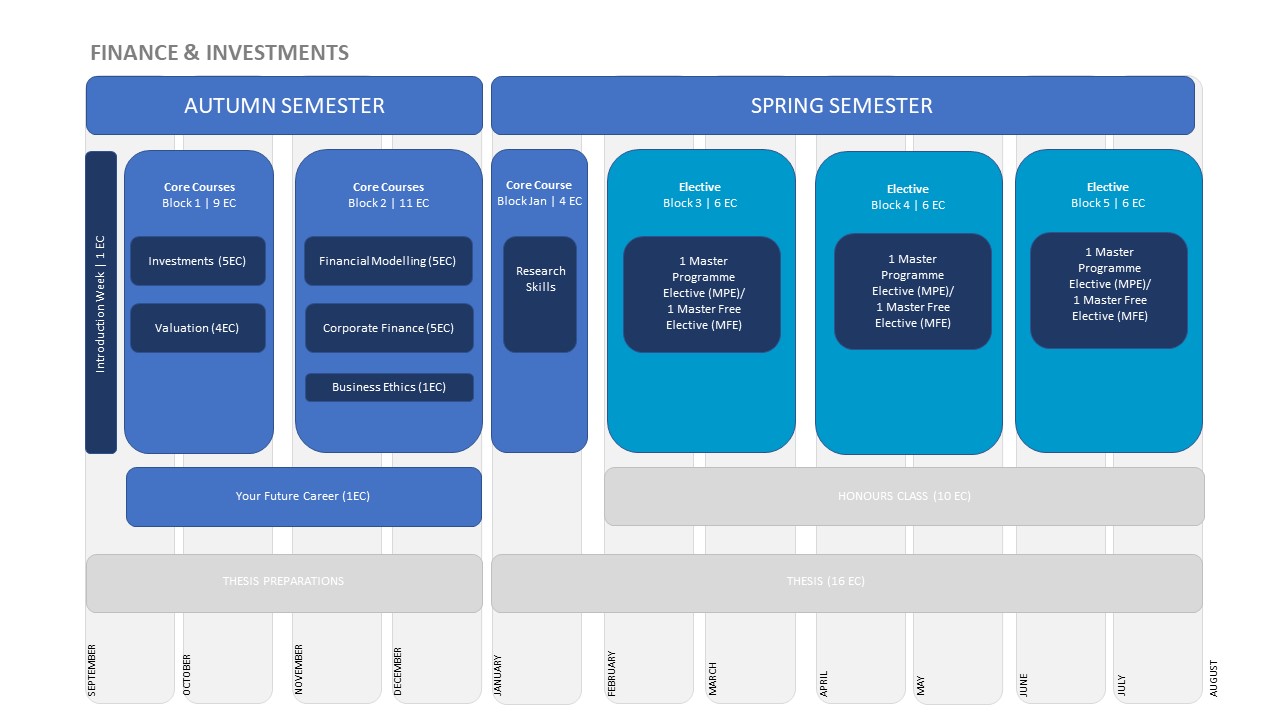
Autumn semester - core courses
During the autumn semester we offer compulsory core courses (26EC) including Business Ethics and Research Skills.
- Introduction week
- Investments
- Valuation
- Your Future Career
- Business Ethics
- Corporate Finance
- Financial Modelling
Spring semester – electives
During the spring semester we offer master electives* (18EC). To provide some guidance, we propose four different tracks, each related to a different career profile:
- Corporate Finance Track
- Asset Management Track
- Financial Analytics Track
- Finance and Innovation Track
Even though each track consists of a suggested trajectory, in most cases, alternative courses are available as well.
You can also replace one elective with an internship or a business project. Throughout the year, you can work on your master thesis project (16 EC).
*Please note that certain electives may be very popular. Although we can place most students in the elective or electives of their choice, we cannot guarantee a place.
For a detailed description of all of the courses including electives, please view the course catalogue (for reference only, catalogue continually updated throughout the year).
Corporate Finance Track
Corporate Finance Track – suggested electives
- Advanced Valuation & Value Creation
- Mergers & Acquisitions
- Financial Distress & Corporate Restructuring
Corporate Finance Track – alternative electives
- Entrepreneurial Finance & Private Equity
- Private Equity
- Banking and Financial Institutions
- Real Estate Finance
- Sustainable Finance
- Behavioural Finance
- Financial Management of Family Businesses
- Internship
Asset Management Track
Asset Management Track – suggested electives
Investment Management
Derivatives
Risk Management and Fixed Income
Asset Management Track – alternative electives
Real Estate Finance
Sustainable Finance
Financial Data Analytics
Quantitative Investment Strategies
Behavioural Finance
Internship
Financial Analytics Track
Financial Analytics Track – suggested electives
Investment Management
Financial Data Analytics
Quantitative Investment Strategies
Financial Analytics Track – alternative electives
Real Estate Finance
Sustainable Finance
Behavioural Finance
Financial Management of Family Businesses
FinTech and Blockchain
Internship
Finance and Innovation Track
Finance and Innovation Track – suggested electives
Entrepreneurial Finance & Private Equity
Banking and Financial Institutions
FinTech and Blockchain
Finance and Innovation Track – alternative electives
Private Equity
Financial Data Analytics
Real Estate Finance
Sustainable Finance
Behavioural Finance
Financial Management of Family Businesses
Internship
Thesis
The master thesis trajectory comprises four compulsory stages that are followed sequentially by the students:
Stage 1: Orientation and topic selection
Stage 2: Research Skills course
Stage 3: Master thesis proposal
Stage 4: Master thesis
After the successful completion of the Master thesis proposal, Master thesis, and defence students obtain 16 EC. The Research Skills course yields 4 EC and is part of the core courses.
Check out the Erasmus University Thesis Repository for examples of theses our alumni have written.
Learn more
CFA/ CAIA
The Chartered Financial Analyst Institute
The CFA® charter is the designation of excellence in the investment community. RSM is one of the few universities in the Benelux that has been awarded CFA® Institute Programme Partner status. The Finance & Investments curriculum provides you with a key advantage in your future career as a financial analyst or investment banker. It is a unique opportunity for you to qualify for the RSM MScFI degree and prepare for the CFA®exams within one academic year.
By your choice of core courses and electives you will be able to optimise your preparation for the CFA® exams. These are held in June and December. You only qualify for the CFA® designation after passing all three levels of CFA® exams and having a number of years of working experience. The costs to participate in the CFA®exams are not included in the tuition fee.
Please find further details on CFA® exams and the requirements on the CFA website.
Chartered Alternative Investment Analyst Association
The CAIA Association is a global professional credentialing body dedicated to creating greater alignment, transparency, and knowledge for all investors, with a specific emphasis on alternative investments. A Member-driven organization representing professionals in more than 95 countries, CAIA Association advocates for the highest ethical standards. The organization provides unbiased insight on a broad range of investment strategies and industry issues, key among them being efforts to bring greater diversification to portfolio construction decisions to achieve better long-term investor outcomes. Our Members represent senior leadership in the allocator, manager, regulator, and academic verticals.
To learn more about the CAIA Association and how to become part of the organization’s mission, please visit https://caia.org/
Honours class
The Honours Class is an interactive course by academics and practitioners on current developments in finance, its relation with technology, and the role of finance in society. The course consists of interactive (guest) lectures as well as a living management case. Topics and cases are each year refreshed reflecting the newest trends in societal thinking and their application to finance.
Review the course guide for more details.
Internship
You can get a taste of working life – from large multinationals to fast-growing start-ups – by applying your new wealth of knowledge to a real company problem during your internship, which is optional in your programme. The RSM Career Centre will support you in finding a suitable position. Many students acquire their first job after graduation from the contacts they make during their internship.
International exchange
Explore the world and broaden your study experiences by going on international study trips and exchanges at other top schools. RSM has an extensive partner school network of more than 100 business schools and universities worldwide, including top business schools such as ESADE in Barcelona and The Wharton School in the USA. An international exchange is an optional element after you’ve studied for your master for at least one year.
Career opportunities
Was it worth the investment? The success of our graduates speaks for itself. Graduates of the Finance & Investments programme are in a position to perform many different finance-related jobs within many different organisations – and have excellent opportunities to do so.
Our graduates today are working for companies that range from financial institutions, like investment and merchant banks (ABN-AMRO, Aegon, Merrill Lynch, Goldman Sachs) to insurers (Aegon) and pension funds. Careers in government (Ministry of Finance, Stock Market Authorities) have also been pursued, as well as in multinational companies (Shell, Philips, Proctor & Gamble).
Graduates choosing the CFA orientation generally start in positions such as junior financial analyst at a bank, mutual fund (e.g., Robeco, Fidelity) or pension fund (e.g., ABP or PGGM). They may also work as financial advisors accounting firms (e.g., Ernst & Young, PricewaterhouseCoopers) and commercial banks (e.g., ING, Rabobank).
More academic challenges
For MSc graduates who would like to advance their education further or who have ambitions within academia, we offer an additional years study leading to a Master of Philosophy in Business Research (MPhil) qualification. The selective MPhil programme allows you to combine education in a specialisation area of your choice with the challenges of undertaking scientific research in a specific field. This focus on research methods and techniques makes this programme a perfect preparation for a successful PhD study in management or business. Our PhD programme is three-years and facilitated by ERIM, our world-class research institute.
Career progress
Many students find positions within multinational firms and organisations, partially thanks to relationships they have developed with representatives from the world of business – as well as peers – during the programme’s corporate and other networking events. Students applying for jobs in their home countries are equipped with knowledge and skills to take with them.
Curious to see what our alumni are doing?
Good to know
Orientation year for Non-EEA graduates
Non-EEA nationals who have earned a diploma from a higher education institute in the Netherlands can apply for a special residence permit called the orientation year after completing their studies. The 'Orientation Year for Graduates Seeking Employment' is a residence permit aimed at retaining foreign talent for the Dutch labour market. During this orientation year you are free to work without a work permit. Participants who find a job during this period can change their orientation year into a residence permit for Highly Skilled Migrants under more favourable terms.
For the most up-to-date information please visit the following website.
Career centre
What's next after your studies? The RSM Career Centre is your guide for an impactful career. Its expertise in the labour market, personal branding and connections with employers will prepare you for your business career. Get ready for some exciting job fairs, workshops, speed interviews and coaching. You may land your first internship or job before you even graduate!
Alumni network
You’re a member of the RSM community from Day 1. After you graduate, you’ll also be a member of the RSM alumni network. The countless benefits include networking events worldwide with local chapters, lifelong learning and professional development, mentoring opportunities and access to the latest business knowledge and research. Your study at RSM is the first step towards being part of this inspiring community that you’ll be part of forever.
Studying at RSM
Talk to our current students!
Fees & scholarships
The 2024-2025 tuition fee for the MSc programmes is approximately €22,500 for non-EEA students. The Dutch government contributes towards this cost for students who hold a nationality from a country belonging to the European Economic Area(EEA). These students therefore only pay the statutory fee €2,530 in 2024-2025.
For EEA nationals who have already completed a master in the Netherlands (and obtained the diploma) the tuition fee for a 2nd master is approximately €13,200.
Please note that all these tuition fee tariffs are subject to change.
There are other costs associated with the Master programmes, for more information please review the “Other expenses” section below thoroughly.
Scholarships
The number of scholarships is limited and mainly merit based. If a scholarship covers only the tuition fees, be aware that you need to finance your own living expenses (rent, food and insurances) for the duration of your studies. RSM does not offer scholarships for the pre-master programme. We do however offer a maximum of 2 scholarships per academic year to RSM pre-master students enrolling in an MSc programme.
Scholarships offered by RSM
Rotterdam School of Management, Erasmus University (RSM) offers multiple scholarships to prospective students from non-EEA countries who are not entitled to pay the EEA tuition fee, provided their grades are considered ‘excellent’. RSM also offers one scholarship, the Erasmus Trustfonds Scholarship, to students from EEA countries.
Other scholarships
Besides scholarships awarded by RSM, there are also scholarships awarded by the Dutch government or other organisations that are available if you meet certain criteria such as nationality, age, etc We have listed some of them below but we encourage you to use resources such as Grantfinder or the Scholarship Portal to find additional scholarships.
- StuNed
- G&D Europe Scholarship
- NN Future Matters Scholarship
- Russia: The Global Education Programme
- LPDP
- OKP
Scholarship tips
- Contact the Ministry for Higher Education in your home country to see whether there are scholarship options.
- We have virtual information session covering all you need to know about scholarships and financial aid. Watch it here.
Student loan options
For students from the Netherlands or the EU/EEA, it may be possible to apply for limited funding towards payment of your tuition fees. Find out whether you meet the nationality and age requirements and read more information about the application process here.
IM/CEMS is a program that - if you are still eligible - entitles you to a maximum of 1 year's use of your DUO entitlements. Students who have received a basic grant and possibly a supplementary grant from DUO in the first year of IM/CEMS and meet the following additional conditions may be eligible for an additional half year (6 months) of financial support, which is equal to the grant received in the last month during the program. Please contact the student counselors for more information.
Conditions Financial Support Fund
Students eligible for financial support due to extended master programmes are those who:
a) are enrolled full-time in a public funded Erasmus University Rotterdam degree programme, which is extended on the base of article 7.4, paragraph 8 of the Dutch Higher Education and Research Act;
b) are enrolled as first enrollment (hoofdinschrijving) in the study programme as referred to under a, for which the student pays statutory tuition fee;
c) for this program, is or was entitled to study finance (prestatiebeurs hoger onderwijs) as referred to in the Wet Studiefinanciering 2000, and during the period corresponding to the study load that exceeds 60 ECs, and is no longer eligible for student finance in the form of an additional grant.
Other expenses
Master Application Handling fee
After having filled in all of the necessary application information on the Online Application Form (OLAF) and uploaded the required documents, applicants with a degree obtained outside the Netherlands will be asked to pay a non-refundable €100 handling fee. This fee can be paid online via the Erasmus Payment System which uses either iDEAL (for those with a Dutch bank account) or PayPal (which can be linked to any bank account or credit card worldwide). It is important that applicants complete the payment process as indicated, otherwise the system cannot register the payment.
Additional programme related expenses
The additional expenses in addition to tuition and general living costs (see below) vary per programme and may include:
- Study materials such as books, readers and business cases
- Costs involved in kick-off meetings
- Costs related to travel, international excursions and compulsory exchange semesters or internships abroad
Approximately € 300 - 500 (per year), these costs differ per programme.
Living expenses
For a reasonable standard of living in the Netherlands, you should have an income of between €1,235-€1,735 per month depending on your lifestyle. Further information about the costs of living in the Netherlands and related subjects can be found on this website. Below is an example of monthly expenditures:
Example of monthly expenditures
| Furnished accommodation, including gas and electricity | € 500-1,000 |
| Medical insurance | € 50 |
| Telephone/internet | € 15-40 |
| Food | € 300 |
| Books, recreation, clothing | € 300 |
| Public Transportation | € 50 |
| Total | € average 1235 - 1735 |
| Other potential expenses: | |
| Buying or renting a bike | € 100 - 250 (per year) |
| In private residence (not student housing) yearly municipal and water taxes | € 100 - 300 (per year) |
| Study trip or other study related travel | € 300 - 500 (per year) |
Study and work - part-time jobs
Please ensure, prior to your arrival at RSM, that you have or will have sufficient funding available to finance your stay at RSM. Finding a part-time job, may be an option, but can not be guaranteed. You should therefore not rely on finding other ways to supplement your income during your studies. For additional information on obtaining a part-time job, visit the website of the Nuffic.
For EEA students there are no formal restrictions in finding work in the Netherlands, but students with a lack of Dutch language skills will find it difficult to secure employment. Non-EEA students are subject to labour regulations, which makes the likelihood of obtaining a work permit very small. We therefore ask students not to rely on this possibility. We do not encourage students to combine studies with the heavy workload from a part-time job.
Admission & application
This maximum for the 2024 intake was reached on 7 October and this application is currently CLOSED. The application for the 2025 intake will open on 1 October. This is a capped programme, which means that the maximum number of applications we accept is 570.
Immigration & housing
Immigration & visas
Find out everything you need to know about entry visas & residence permits for non-EU or EEA students at RSM.
Housing
Finding housing in Rotterdam can be tricky. To help you in your search for housing, we have compiled some helpful resources

